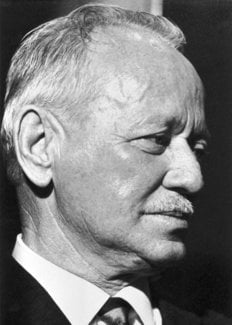Mikhail Sholokhov
Biographical

Mikhail Aleksandrovich Sholokhov (1905-1984) was born in the land of the Cossacks, now known as the Kamenskaya region of the R.S.F.S.R. He attended several high schools until 1918. During the civil war he fought on the side of the revolutionaries, and in 1922 he moved to Moscow to become a journalist. There he published a number of short stories in newspapers. He made his literary debut in 1926 with a volume of stories, Donskie rasskazy (Tales from the Don), 1926, about the Cossacks of his native region, to which he had returned two years earlier.
In the same year, 1926, Sholokhov began writing Tikhi Don (And Quiet Flows the Don), 1928-1940, which matured slowly and took him fourteen years to complete. Reminiscent of Tolstoy in its vividly realistic scenes, its stark character descriptions and, above all, its vast panorama of the revolutionary period, Sholokhov’s epic became the most read work of Soviet fiction. Deeply interested in human destinies which are played against the background of the transformations and troubles in Russia, he unites in his work the artistic heritage of Tolstoy and Gogol with a new vision introduced into Russian literature by Maxim Gorky.
His other major work in the Don cycle, Podnyataya tselina (Virgin Soil Upturned), 1932 and 1959, deals in part with the collectivization of the Don area. There are a number of works such as the short story Sudba cheloveka (The Fate of a Man), 1957 – made into a popular Russian film – which treat the power and the resilience of human love under adversity. His collected works, Sobranie sochineny, were published in eight volumes between 1956 and 1960. In 1932 Sholokhov joined the Communist Party and, on several occasions, has been a delegate to the Supreme Soviets. In 1939 he became a member of the Soviet Academy of Sciences and later vice president of the Association of Soviet Writers.
This autobiography/biography was written at the time of the award and first published in the book series Les Prix Nobel. It was later edited and republished in Nobel Lectures. To cite this document, always state the source as shown above.
Mikhail Sholokov died on February 21, 1984.
Nobel Prizes and laureates
Six prizes were awarded for achievements that have conferred the greatest benefit to humankind. The 14 laureates' work and discoveries range from quantum tunnelling to promoting democratic rights.
See them all presented here.
